#leonid kalashnikov
Explore tagged Tumblr posts
Text
After meeting with Donald Trump in Florida, Hungarian Prime Minister Viktor Orbán decided on March 10 to detail what he said were the former US president’s plan to end the war in Ukraine in 24 hours.
Just as Russian experts and pundits had long suspected, the plan is merely an intention to terminate US aid to Ukraine, in hopes that the conflict between the empowered invader and his intended victim would eventually fizzle out.
Orbán said: “[Trump] will not give a penny in the Ukraine-Russia war. That is why the war will end.” He added, “If the Americans don’t give money and weapons, along with the Europeans, then the war is over. And if the Americans don’t give money, the Europeans alone are unable to finance this war. And then the war is over.”
The Hungarian leader, still bristling from being brushed aside at the February 1 European Union (EU) summit that agreed to provide $54bn in Ukraine aid, suggested Trump’s actions would bring a truce. Leaving Ukraine without Western aid would eventually force it to capitulate. While the further dismemberment of Ukraine was not mentioned, the Kremlin has made clear it has greater ambitions beyond the lands it already seized.
The horrors of Russia’s occupation and the avowedly genocidal intent of its state-funded mouthpieces towards Ukrainians got no mention at all.
It is highly unusual for a visiting foreign head of government to meet with a former president, and to completely bypass the US administration.
Even Trump’s Russian admirers found the arrangement quite brazen. During the evening broadcast of a state TV show 60 Minutes on March 11, State Duma member Leonid Kalashnikov marveled at Trump’s devil-may-care attitude.
Describing Trump as “unhinged,” the Russian lawmaker said that the former US president is “behaving as a Russian,” citing Orbán’s recent visit as an example.
Kalashnikov stated: “I am a fan of Trump, based on the interests of my country.” He expressed gratitude for the four-year reprieve he said Trump’s presidency provided for Russia, allowing the country to prepare for its expanded invasion of Ukraine. This is not unusual — lawmakers and foreign policy experts frequently gush about their affinity for Trump as “the destroyer of America.”
During the morning broadcast of 60 Minutes on March 11, host Olga Skabeeva smirked and gloated about Orbán divulging Trump’s “secret plan.”
Set to a jolly tune, the report remarked that Make America Great Again (MAGA) Republicans in the US Congress are already helping Trump in his plan, blocking American aid to the fledgling democracy.
Skabeeva said: “If Trump wins the election, he won’t give a penny to Ukraine.” She cited Orbán’s words that after America ends aid to Ukraine, Europeans would follow suit and the conflict will resolve itself. Skabeeva noted: “This scheme suits us well.”
After mentioning Trump’s alleged intent to restructure any potential aid to Ukraine as a debt that would have to be repaid, Skabeeva flashed a lopsided grin and let out an uncontrolled giggle. Even the former president’s cheerleaders in Moscow suspect that this is not a serious suggestion, but merely a fig leaf to conceal his indifference to Ukraine’s future and a delaying tactic towards a country at war, where delays translate into more death and suffering.
Recent overtures about negotiations by Pope Francis have garnered nothing but scorn from Russia’s most prominent propagandist, state TV host Vladimir Solovyov (despite the Pope’s suggestion that Ukraine “show the courage of the white flag.”)
He was more inclined to fawn over Orbán’s assurances that Trump simply plans to abandon Ukraine, allowing it to be erased by the Kremlin. Readying for an authoritarian new world where the democratic norms are obsolete, Solovyov suggested that Russia abandon language suggesting it’s a democracy, or even stop using the related terms.
During the March 11 broadcast of The Evening With Vladimir Solovyov, political scientist Sergey Mikheyev hypothesized that during Trump’s potential second term, Orbán might become an official intermediary between Trump and Putin. Mikheyev said that Hungary would thereby gain an invaluable position of global influence.
Surmising that Trump’s return to the White House would mean the inevitable fall of Ukraine, Solovyov added that Hungary would also expand its borders by being gifted the Ukrainian Carpathians — courtesy of both Trump and Putin.
Pundits in the studio laughed out loud, but Solovyov shook his head and emphasized, “I am not joking whatsoever.”
14 notes
·
View notes
Text
I recently spoke with the Kyiv-based journalist Leonid Shvets, whom I have found, over the years, to have a knack for pithily formulating the views of the Ukrainian mainstream. He told me that conversations in which Americans came up with scenarios for Ukraine to surrender drove him up a wall. “Why don’t you surrender to the Chinese?” he said. “Give them Florida. You have lots of states, what’s one state less?” Florida, of course, was a complicated example. “Or, if you’re so eager to make a deal with the Russians, why don’t you give them some of your land? Give them Alaska.” He thought that anything short of total defeat for Putin would just mean that the war would start up again. “We went through this already in 2014,” he said.
“Here’s the problem,” he continued. “If we freeze the situation where it now is, not along Ukraine’s internationally recognized border but along whatever line the front happens to be at, then we acknowledge that internationally recognized borders are just a kind of fiction, which you can ignore. That’s a very bad lesson. And, second, if we put the borders in this new place, then we’re in a situation where this new border is worth even less than the internationally recognized border. Maybe a new military operation will move it even further, move it over here, or move it over there. So at that point it is just totally without meaning.”
Shvets acknowledged that people in Ukraine were exhausted after a year and a half of war. “No question, every day the war goes on is, for us, specific people who are lost, and specific houses that are destroyed. Absolutely. But we are not yet ready for defeat.” He went on: “There may come a point where we need to negotiate. But from where we are right now, that point is not visible to me.”
There are dissenting voices within Ukraine, but they are seldom heard from in public. One former official, who asked that we disguise his identity, told me, “The dialogue is not just toxic. If you are not jumping up and down with the mainstream, then you are an enemy.” The former official was not an enemy, but he did blame the Zelensky administration for its lighthearted and irresponsible attitude toward the Russian troop buildup in 2021. The former official was getting his family out of the country and making preparations for what he believed was an imminent attack. Meanwhile, Zelensky was telling people to remain calm and citing Ukraine’s sovereign rights. This, the former official said, was a grave miscalculation. “When there’s a crazy person next to you with a Kalashnikov, you don’t start talking to him about the U.N. Charter!”
The former official believes that the Istanbul talks were the best chance at a more or less stable peace. “Back then Bakhmut was a beautiful city,” he said. “Mariupol was under Ukrainian control.” But now “there is no win-win solution any longer,” he said. “Someone will have to lose.” He hoped it would be Russia. But he feared it could be Ukraine. I asked him when public opinion might begin to turn. “When every single person knows someone who has been killed or wounded,” he replied. The country was getting there.
For Charap, the Ukrainian position on when to stop fighting is decisive, but it’s an evasion of responsibility to pretend that the U.S. can’t have an opinion on the matter. “You have to do this with the Ukrainians,” he said. “You can’t do it to the Ukrainians. But to suggest that we have no ability to influence them in any way is disingenuous. Like, we feel it’s O.K. to advise them about everything under the sun, but not war termination?”
19 notes
·
View notes
Text
Should the sino russian commonwealth come to reality it would create not only the largest state on earth but also the greatest anti-imperialist force ever
The post is machine translated
Translation is at the bottom
The collective is on telegram
⚠️ LEONID KALASHNIKOV: "RUSSIA E CINA SI SOSTENGONO A VICENDA, PRIMA O POI SI FORMERÀ UN COMMONWEALTH" ⚠️
🛠 Leonid Ivanovich Kalashnikov, Presidente della Commissione per gli Affari della Comunità degli Stati Indipendenti, Integrazione Eurasiatica e Relazioni con i Compatrioti, membro del Partito Comunista della Federazione Russa, ha affermato che Russia e Cina stanno lavorando alla formazione di una forte alleanza contro l'Occidente:
💬 "La nostra Unione con la Bielorussia è circondata dall'Europa, e posta sotto sanzioni. Anche la Cina è stata posta sotto alcune sanzioni, e sta venendo ulteriormente minacciata. Perciò, prima o poi si formerà un «Commonwealth» [tra Russia e Cina], ha già iniziato a prendere forma" ⭐️
💬 "Ci sosteniamo a vicenda quando si vota alle Nazioni Unite e in altre organizzazioni internazionali, lo facciamo ormai da diversi anni. La Cina sa bene che sarà la prossima, e non vuole essere lasciata da sola sotto la minaccia della Guerra, che ora ci viene dichiarata, e domani - forse - che verrà dichiarata anche alla Cina" ⭐️
🔍 Per chi volesse approfondire il Tema della Cooperazione Sino-Russa e la Cooperazione tra CPC e KPRF, può rifarsi a questi post del Collettivo Shaoshan e a questi link:
🔺Master-Post sui Rapporti tra Cina e Russia 💕
🔺La Russia loda e sostiene il Documento della Cina sulla Pace ❤️❤️
🔺Il Partito Comunista Cinese si congratula con il KPRF per il suo 30° Anniversario ⭐️
🔺Sergej Lavrov: "I rapporti tra Russia e Cina sono migliori di qualsiasi alleanza militare" ❤️
🌸 Iscriviti 👉 @collettivoshaoshan
⚠️ LEONID KALASHNIKOV: "RUSSIA AND CHINA SUPPORT EACH OTHER, SOON OR LATER A COMMONWEALTH WILL BE FORMED" ⚠️
🛠 Leonid Ivanovich Kalashnikov, Chairman of the Commission on Affairs of the Commonwealth of Independent States, Eurasian Integration and Relations with Compatriots, member of the Communist Party of the Russian Federation, said that Russia and China are working on forming a strong alliance against the West:
💬 "Our Union with Belarus is surrounded by Europe, and placed under sanctions. China has also been placed under some sanctions, and is being further threatened. Therefore, sooner or later a «Commonwealth» [between Russia and China], has already started to take shape" ⭐️
💬 "We support each other when voting in the United Nations and in other international organizations, we have been doing it for several years now. China knows very well that it will be next, and does not want to be left alone under the threat of war, which is now is declared, and tomorrow - perhaps - it will also be declared to China" ⭐️
🔍 For those wishing to learn more about the Sino-Russian Cooperation and the Cooperation between CPC and KPRF, you can refer to these posts by the Shaoshan Collective and to these links:
🔺Master-Post on Relations between China and Russia 💕
🔺Russia praises and supports the China Peace Document ❤️❤️
🔺The Communist Party of China Congratulates the KPRF on Its 30th Anniversary ⭐️
🔺Sergej Lavrov: "Relations between Russia and China are better than any military alliance" ❤️
🌸 Subscribe 👉 @collettivoshaoshan
#socialism#china#italian#translated#china news#communism#collettivoshaoshan#xi jinping#marxism leninism#marxist leninist#marxismo#marxist#marxism#socialismo#socialist#news#russian news#multipolar world#multipolarity#russian politics#chinese communist party#chinese politics#kprf
0 notes
Video
tumblr
Stalker (1979)
Director: Andrei Tarkovsky
Cinematographer: Aleksandr Knyazhinskiy, Georgi Rerberg, Leonid Kalashnikov
#Stalker#Andrei Tarkovsky#Aleksandr Knyazhinskiy#Georgi Rerberg#Leonid Kalashnikov#telelizion#lizcore
2 notes
·
View notes
Photo






Stalker (1979), dir. Andrei Tarkovsky
Cinematography by Alexander Knyazhinsky and Leonid Kalashnikov
#stalker#andrei tarkovsky#russian cinema#cinematography#alexander knyazhinsk#leonid kalashnikov#screencaps#film
1 note
·
View note
Photo
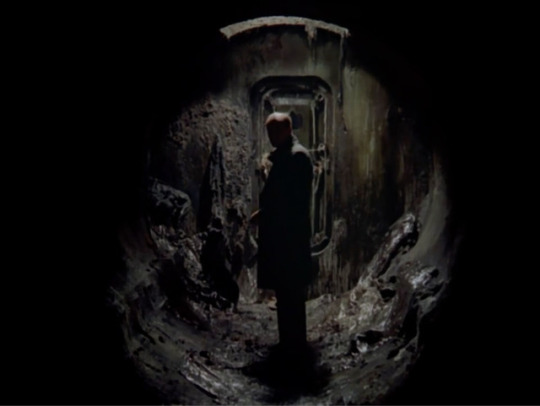
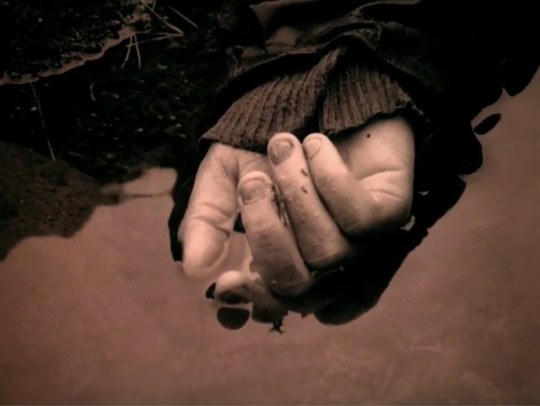

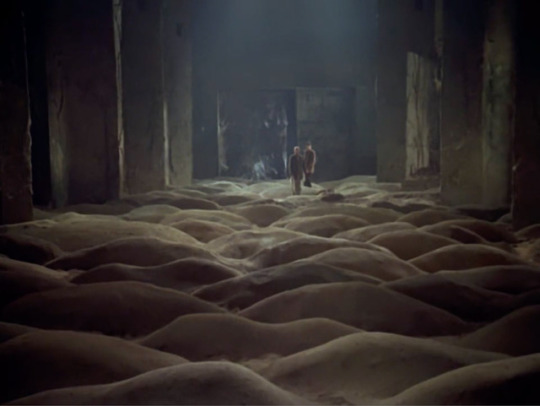
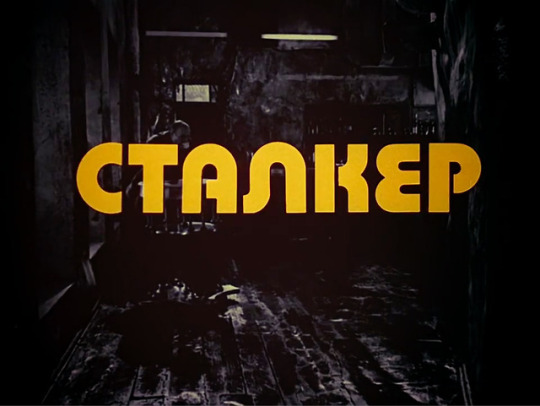
Stalker (1979) Dir. Andrei Tarkovsky, Cins. Aleksandr Knyazhinskiy, Georgi Rerberg, and Leonid Kalashnikov
“I think it lets those pass who have lost all hope. Not good or bad, but wretched people.”
#stalker#cinematography#andrei tarkovsky#aleksandr kaydanovskiy#anatoliy solonitsyn#nikolay grinko#Russia#russian cinema#aleksandr knyazhinskiy#georgi rerberg#leonid kalashnikov#Movies based on books#movies#movie frames#film still#four frames at a time#1970s#1970s movies#movies i watched in 2018
113 notes
·
View notes
Photo










“Let everything that's been planned come true. Let them believe. And let them have a laugh at their passions. Because what they call passion actually is not some emotional energy, but just the friction between their souls and the outside world. And most important, let them believe in themselves. Let them be helpless like children, because weakness is a great thing, and strength is nothing. When a man is just born, he is weak and flexible. When he dies, he is hard and insensitive. When a tree is growing, it's tender and pliant. But when it's dry and hard, it dies. Hardness and strength are death's companions. Pliancy and weakness are expressions of the freshness of being. Because what has hardened will never win.”
Stalker (1979, Andrei Tarkovsky)
cinematography by Aleksandr Knyazhinskiy, Georgi Rerberg, and Leonid Kalashnikov
#stalker#andrei tarkovsky#cinematography#aleksandr kaydanovskiy#anatoliy solonitsyn#nikolay grinko#aleksandr knyazhinskiy#georgi rerberg#leonid kalashnikov#stills#500
967 notes
·
View notes
Photo








Тема / The Theme (1979) реж. Глеб Панфилов
#Inna Churikova#Michail Ulyanov#gleb panfilov#Тема#тема 1979#глеб панфилов#инна чурикова#михаил ульянов#leonid kalashnikov#леонид калашников#russian cinema#screencaps*#ussr#soviet cinema#the theme#the theme 1979
22 notes
·
View notes
Photo
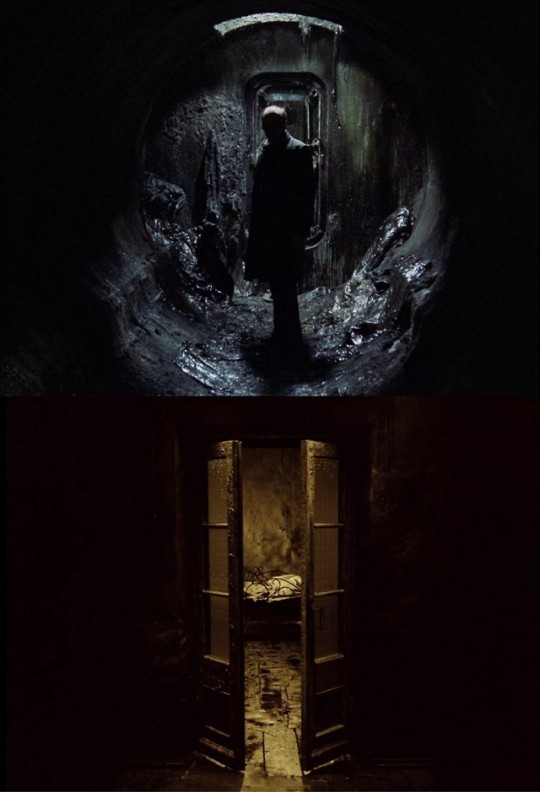
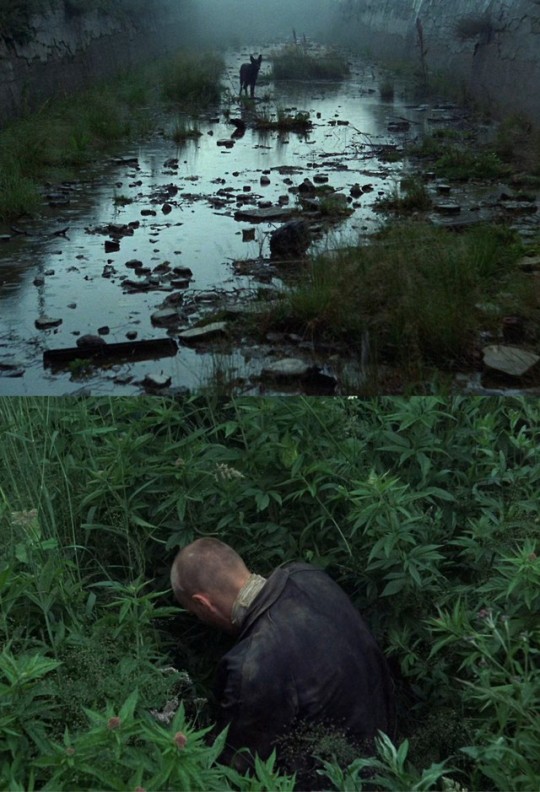
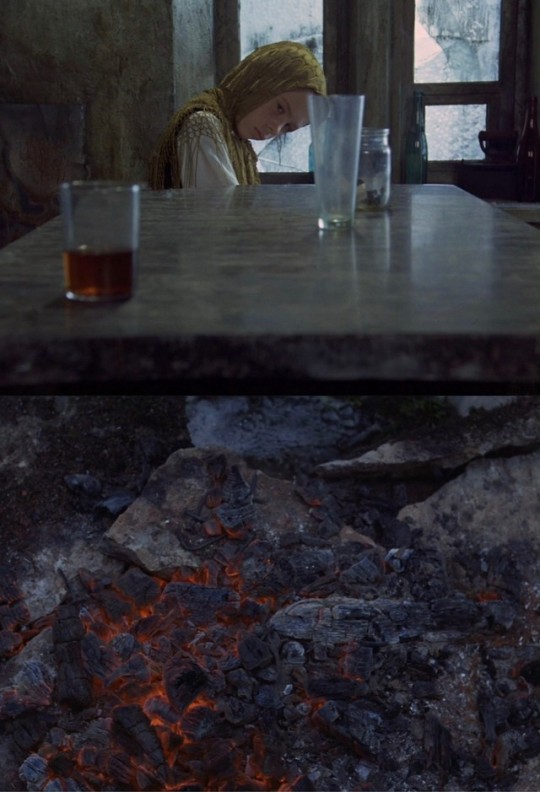
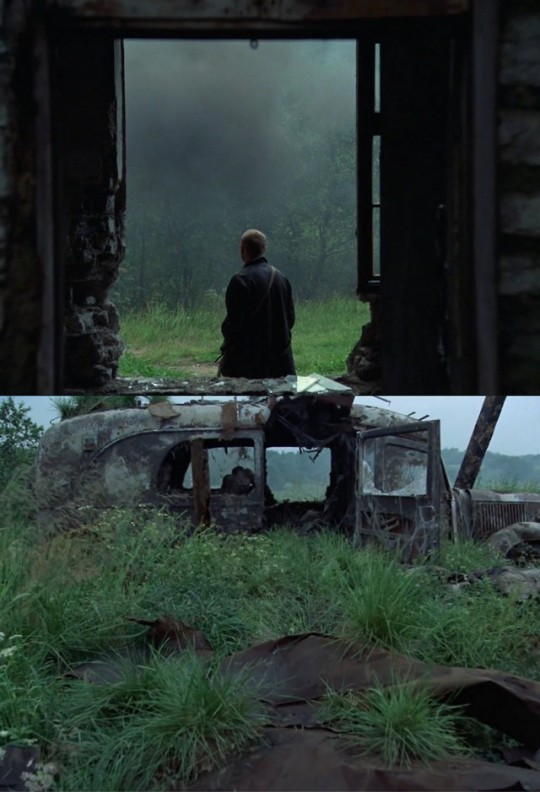

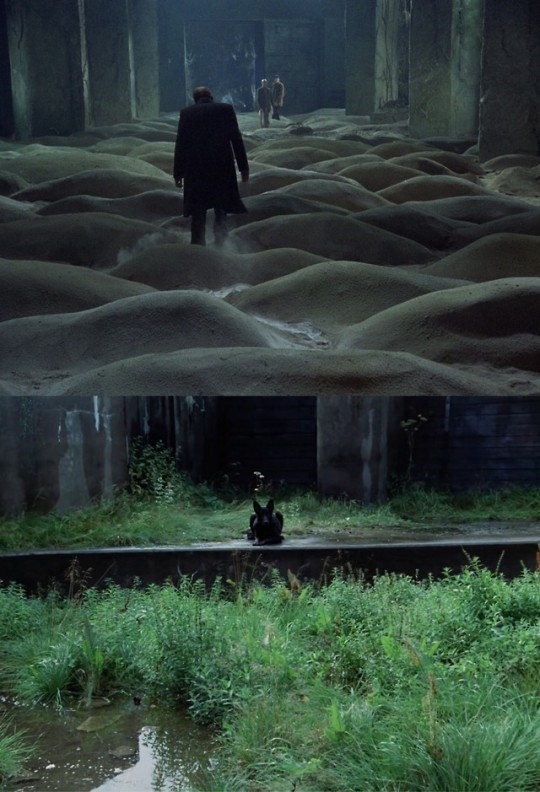
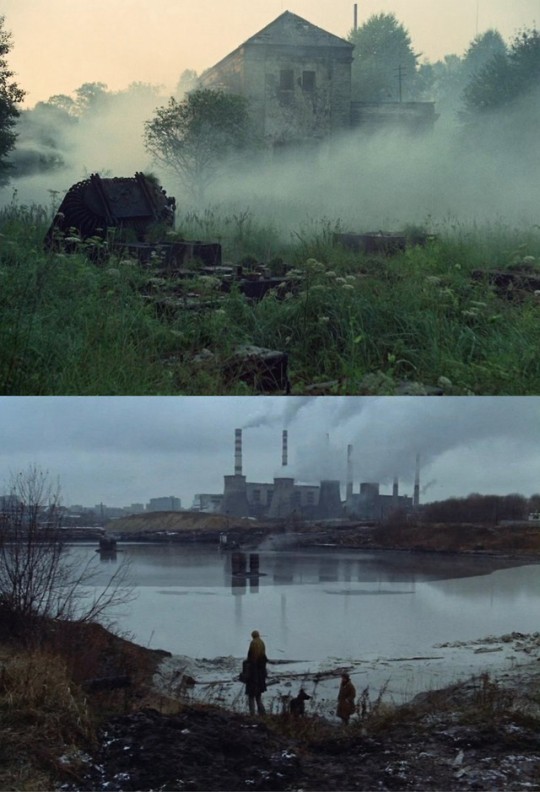

Stalker, directed by Andrei Tarkovsky, screenplay by Andrei Tarkovsky, Arkadiy Strugatskiy, and Boris Strugatskiy, cinematography by Aleksandr Knyazhinskiy, Georgi Rerberg, and Leonid Kalashnikov, and edit by Lyudmila Feyginova.
264 notes
·
View notes
Photo
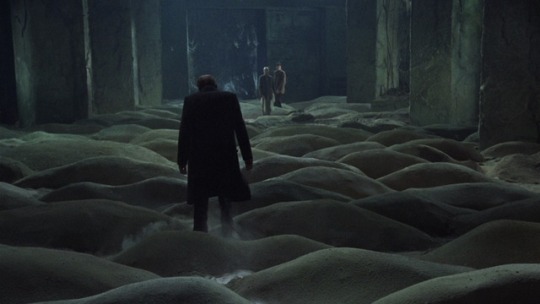
Stalker (1979, Soviet Union)
Before one makes assumptions about this film’s title, the word “stalker” here refers to both the modern definition of the word and as a nickname (from Rudyard Kipling’s Stalky & Co.) for a character who smuggles people to a specific place. Andrei Tarkovsky’s ponderous, glacially-paced Stalker is among the greatest science-fiction movies – delving into questions of existentialism, rational choice, the danger of subconscious desire, faith, and the limits of human understanding. For Stalker, Tarkovsky has fully embraced minimalism – the film has 142 shots in its 163-minute runtime (the longest shots are uncut for over four minutes; the first spoken line appears after nine-and-a-half minutes) – making this movie inaccessible for those without grounding in or preparation for “slow cinema”. Tarkovsky’s final film produced solely in the Soviet Union is a deeply introspective work, bewildering in the best way, always astonishing.
In an unnamed country, the “Stalker” (Alexander Kaidanovsky) sneaks people into a place known as the Zone. The Zone, bereft of human residents, is heavily guarded along its outer perimeter, but the police and military dare not enter it. One day, the Stalker – shown to be living in poverty with children, and urged by his wife (Alisa Freindlich) not to leave – has agreed to guide the “Writer” (Antoly Solonitsyn) and the “Professor” (Nikolai Grinko) to the Zone.
The laws of physics and time do not apply in the Zone. And it is rumored that, somewhere in the Zone, there is a “Room” that grants the innermost wishes of anyone who steps foot inside. The reasons for a guide are many: the straightest path will result in certain death, any routes that once led to the Room become impassable because geography can change in a matter of minutes, and the Zone’s innumerable traps (mental and physical) can only be sensed and never seen. Depending on the viewer’s interpretation, the Zone and/or the Room may be sentient. The Stalker demands that the Writer and Professor obey his orders. During their journey, they talk about their motivations for finding the Room. The Writer has lost his artistic inspiration, the Professor reveals a nebulous desire for scientific analysis, and the Stalker – who says he does not wish to use the Room – does not reveal his intentions for guiding others through the Zone until the final minutes.
There are no villains or monsters, spectacular special effects, or anything that one might expect from a science-fiction film. This is Tarkovsky’s second science-fiction work after Solaris (1972) – a space story that analyzed the essence of love when it collides with questions of experienced reality (Solaris is a rejection of what Tarkovsky believed to be Western sci-fi’s coldness, as embodied in 2001: A Space Odyssey) – but Stalker is almost nothing like that earlier film. This film is only considered science-fiction because of the physical impossibilities of the Zone, not because of any space travel or futuristic technologies. In a development I had never considered for a science-fiction film, almost none of the questions that Stalker poses to the audience have anything to do with science or technology. While recognizing that the greatest science-fiction works examine the nature of humanity, all the science-fiction media I had consumed prior to seeing Stalker contained elements of how humanity intersects with science and technology. This relationship is almost, if not non-existent in Stalker, appearing only at the conclusion. Stalker is entirely interested in the hearts and minds of the three leads – what they are subjected to while traversing the Zone, however disturbing, does not influence the people they are and the final decisions they will make. The Room is only a projection of their humanity; it does not shape who they are. This is reinforced by the Stalker’s true introductory words upon entering the Zone:
Our moods, our thoughts, our emotions, our feelings can bring about change here. And we are in no condition to comprehend them... everything that happens here depends on us, not on the Zone.
Loosely adapted from Arkadi and Boris Strugatsky’s intricate novel Roadside Picnic (Arkadi and Boris were brothers and co-wrote the adapted screenplay), Tarkovsky simplified what he could for the big screen. This meant compositing multiple characters into the three primary characters for the film and trimming down several years of excursions into the Zone down to a single sojourn. Interference from the Soviet censors and the accidental destruction of the original negatives at the film processing laboratory necessitated the introduction of intertitles announcing a first and second part. Episodes of state interference frustrated Tarkovsky as well (the censors did not request as many changes in Stalker compared to previous Tarkovsky films, but they could not tolerate narrative ambiguity of any sort, even if they could not find any specific anti-communist themes), who was forced to shoot almost the entire film three separate times, and led to him looking towards the West for work. It is the third and last effort that is available to audiences today.
With all these compromises and production nightmares, Tarkovsky was given multiple opportunities to make the best possible film he could. Production difficulties also meant Alexander Knyazhinsky became principal cinematographer over Leonid Kalashnikov (1969′s The Red Tent), who himself replaced another cinematographer before that. One of Knyazhinsky’s decisions mirrors The Wizard of Oz (1939) – the opening scenes are shot in sepia and all scenes in the Zone are shot in color. In entering the Zone, Knyazhinsky and Tarkovsky allow for an extended tracking shot that allows a glimpse into the uncertainty of the three men journeying to the Room:
youtube
This tracking shot sets the pace and tone for the remainder of the film (notice how the clacks of the wheels become indistinguishable from Tarkovsky regular Eduard Artemyev’s film score – the Azerbaijani tar is feature heavily, and the above instance will not be the last time rhythmic sound effects become inseparable from the music). Shot in Estonia, Stalker utilizes a lush, but lifeless landscape littered with human reminders of what life was like before the Zone was created. Wind is everywhere, even if the sound mix does not pick up on it. The grasses sway, the tree leaves rustle, and a low-lying fog brushes across the flora. Also omnipresent is water – whether on the grasses due to recent rains, flooded buildings, walkways turned into creeks, or deafening waterfalls. The second half’s interior scenes were shot at deserted hydro power plants already filled with fetid liquid and marked by years of abandonment (conditions were so poor that sound designer Vladimir Sharun believes chemical poisoning from these locations hastened the deaths of three crew members, including Tarkovsky). Almost suggestive of a post-apocalyptic world with industrial and military scrap strewn across the Zone, the effect is a serene suspense. The suspense, beginning with the above tracking shot, is cumulative. With death or separation possible at any turn, a slow walk to check for traps and a trip through a waterlogged pipe inspire interminable dread.
Amid this dread, what begins as a partnership defined by obeying the Stalker’s orders transforms into a series of bursts of overwhelming philosophy, ad hominem, poetry recitations from the mouth and mind (the poems used are by Fyodor Tyutchev and Tarkovsky’s father, Arseny), and rare instances of humor. The Stalker speaks of the Zone as a holy, perhaps partially sentient place not to be mistreated. The way he describes his work is not only to serve as a guide, but to offer a sort of deliverance (for himself? Those who hire him? The Zone?). Among these three, their initial intentions are not as they first appear. Cynicism and dismissive attitudes towards the Zone and the Room belie personal weakness and tragic character flaws. A front of altruism is stripped away, revealing exhausting fear, material desperation, spiritual emptiness. Just as important as what the Stalker, Writer, and Professor say to each other is what they do not say to each other – in Stalker, silent shots of the character’s faces say just as much as the philosophical soliloquies. This is outstanding acting from Kaidanovsky, Solonitsyn, and Grinko.
The film’s primary themes revolve around the subconscious and one’s deepest desires. Those desires are usually never the ones we speak about when questioned by others. Instead, they are the ones that reveal our most sinister, selfish urges – stripped of social constructs, morals, restraint, and the judgment rendered by even those closest to us. Or perhaps excursions through the Zone (failed and otherwise) and entrances into the Room grant something far more minatory: latent revelations and wishes which may never be understood.
Perhaps it is that pure expression and dogged pursuit of individualism which scared the Soviet Union. Indeed, Soviet science-fiction literature has a history of critiquing authoritarianism, communist and capitalist systems, and cults of personality. The self-understanding achieved in Stalker is not common in fiction or real life – the realities are deeply unpleasant, but not approached cynically. The realization of these realities provokes different responses from the characters: anger and anguish. Stalker, through its framing and narrative escalations, is evocative of classic horror films – where a dense, foreboding atmosphere is the source of the horror. The horror in Stalker includes the desolate locations it features, but most importantly the purposes of the three men who seek the Room.
Released to heavy criticism in the Soviet Union, contemporary opinion has been kinder to Stalker. Western critics compare the Heart of Darkness-esque narrative to Francis Ford Coppola’s Apocalypse Now. But Stalker has much more to say than Coppola’s film, preferring to examine its subjects for who they are and what they bring to their newfound surroundings rather than the reverse. Rather than Joseph Conrad, Tarkovsky takes his literary cues not only from the Strugatsky brothers, but also those giants of Russian literature: Leo Tolstoy and Fyodor Dostoyevsky. Without spoiling too much, the Stalker’s enterprise seems informed by the title character in Tolstoy’s The Death of Ivan Ilyich (Ivan Ilyich is a dying man pondering the nature of his death and, increasingly, his life’s meaning) while his characterization resembles the title character in Dostoevsky’s The Idiot (whose epileptic bouts make people believe he is unintelligent, when he, despite being socially awkward, is anything but).
For first-time viewers, Stalker will baffle, enrage, and mystify. It should be viewed as cinematic poetry rather than a straight-laced narrative. This film conveys complicated ideas of desire and the changes resulting from desire that too few are receptive to. The few answers Stalker does provide are shrouded in its darkest corners, waiting to be discovered by those brave enough to present themselves and step forth. Do not expect anything flattering.
My rating: 10/10
^ Based on my personal imdb rating. Stalker is the one hundred and forty-sixth film I have rated a ten on imdb.
#Stalker#Andrei Tarkovsky#Alexander Kaidanovsky#Anatoli Solonitsyn#Nikolai Grinko#Alisa Freindlich#Sergei Yakovlev#Natasha Abramova#Arkadi Strugatsky#Boris Strugatsky#Alexander Knyazhinsky#Eduard Artemyev#TCM#My Movie Odyssey
3 notes
·
View notes
Photo

Después de la unificación de Rusia y Bielorrusia en el Estado de la Unión, los países que anteriormente formaban parte de la URSS pueden unirse a ellos; dijo Leonid Kalashnikov, jefe del Comité de Asuntos de la CEI, Integración Euroasiática y Relaciones con los Compatriotas de la Duma Estatal, compartió esta opinión en una entrevista con URA.RU. https://soyarmenio.com/noticias-internacionales/rusia-y-bielorrusia-inician-version-capitalista-de-la-urss/
0 notes
Photo
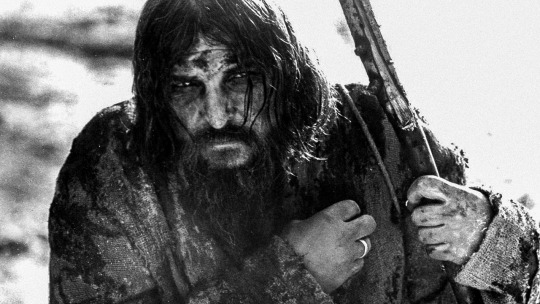
Агония
(1981) dir. Elem Klimov
★★★☆☆
Agonía es una película de la URSS dirigida y producida por Elem Klimov —también conocido por Ven y Mira (1985)— que sirve como una biografía visual de la turbulenta vida y muerte de Grigori Rasputin (Aleksey Petrenko), un hombre que fue muy cercano a la realeza durante el período de Nicolás II de Rusia, el último emperador de la nación. El filme muestra su ascenso al poder y su locura durante la cima de su ¿fama? La cinta incluye elementos de drama histórico y documental que hacen que Agonía sea tan especial.
La actuación de Petrenko es, en pocas palabras, fenomenal; realmente encarna el personaje del icónico villano ruso, con una presencia estable e impresionante que se mantiene durante todo el transcurso de la película. También, el contraste entre la personalidad monstruosa de Rasputin contra la cinematografía que incluye colores vibrantes (realizada por Leonid Kalashnikov), la vestimenta impresionante y los sets bien empleados hacen que esta película sea tan importante visual como narrativamente.
Considero que Klimov logra hacer que el espectador pueda ver a Rasputin como un humano y no tanto como este personaje malvado que realmente es. Dicho esto, estoy más que consciente que Rasputin no era éticamente una buena persona, sin embargo admiro que el director del filme le haya otorgado esta oportunidad para conocer todas las capas que hacen a Grigori Rasputin.
0 notes
Text
USA plans American Corners in Kazakhstan to sow anti-Russian sentiments
New Post has been published on https://armenia.in-the.news/economy/usa-plans-american-corners-in-kazakhstan-to-sow-anti-russian-sentiments-50403-14-08-2020/
USA plans American Corners in Kazakhstan to sow anti-Russian sentiments

The USA is opening the “Fourth Kazakhstan Front,” and Russia has nothing to oppose to this. The US State Department plans to finance a program for the development of American Corners in Kazakhstan.

According to the document released by the public relations department of the US Embassy in Nur-Sultan (the capital of Kazakhstan, formerly known as Astana), the department intends to allocate up to 30 grants ranging from $2,500 to $50,000 in nine cities across Kazakhstan.
It is expected that the grant recipients will take part in the development of educational programs on the topics proposed by the American side, including such as economics and entrepreneurship, media literacy, cultural heritage, innovation and climate. In a nutshell, the USA wants to to transform the mentality of the people of Kazakhstan.
USA opens Fourth Kazakhstan Front
“It is easy to guess that, despite the declared topics, such as economy, entrepreneurship, media literacy, cultural heritage, innovation and climate, the main goal of these centers is to foster anti-Russian and anti-Russian sentiments in the people of Kazakhstan,” blogger and journalist Ibrash Nusupaev wrote on Facebook.
According to the blogger, the Americans will be pedalling the following topics, as he assumes: “the Russians orchestrated the Holodomor and killed 3.5 million Kazakhs”, “Russia took out all the natural resources of Kazakhstan”, “Russia seized television broadcast of Kazakhstan”, “Russian missiles destroy the ecology of Kazakhstan.”
Answering Nusupayev’s question about the front that the Americans intend to open in Kazakhstan against Russia, we can say that after the victories of the “revolutions” in Ukraine, Armenia, and also Belarus, it is the Fourth Kazakhstan Front has already been opened.
Destabilization of Kazakhstan is next on the list
Vladimir Zharikhin, deputy director of the Institute of CIS Countries, told Pravda.Ru that the United States has been running this policy against the background of the connivance and support of the authorities of Kazakhstan.
“Let’s divide the blame for further destabilization between the evil Americans and the good authorities of Kazakhstan. The poor, unfortunate Kazakh authorities cannot do anything. The Americans come to Kazakhstan and put their feet on the table, as they normally do, but the authorities of Kazakhstan can not do anything. In fact, they can, but they do not want to. Therefore, it will be them who will be to blame in the first place for the destabilisation of Kazakhstan,” Vladimir Zharikhin said.
“We can see the consequences of such a policy in Ukraine. Nevertheless, the authorities are willing to take it. It means that they are primarily concerned about their own interests, rather than the interests of the people,” the expert added.
According to Vladimir Zharikhin, Russia does not have such programs in the countries of the Commonwealth of Independent States, because there are no ideas.
“What was the idea until now? Let’s build capitalism together – the capitalism that they have in the West and even better. They do not want to do with with Russia – they want to do it with the original source of capitalism,” the expert noted.
What will save Kazakhstan?
According to Zharikhin, Kazakhstan’s first president (Nazarbayev) is “considerably smarter” than the president of Belarus. (Lukashenko). He opted for the transition of power and chose “a very authoritative person – a professional in international relations and economy (Tokayev), a former prime minister and UN deputy secretary general.”
“Kazakhstan, which is sandwiched between Russia and China, is destined to maintain good and neighbourly relations with these two countries. Tokayev is perfectly aware of that,” summed up Vladimir Zharikhin.
Russia’s soft power is about students from the CIS
According to Leonid Kalashnikov, Chairman of the State Duma Committee on CIS Affairs, Eurasian Integration and Relations with Compatriots, Russia urgently needs to increase the number of budgetary seats in its universities for students from CIS countries.
“A person, who received education in Russia, will treat Russia with respect throughout their lives. They will know Russian too. When those people return to their countries, they will be promoting a benevolent policy towards Russia,” the deputy said.
Read original article here.
0 notes
Text
0 notes
Text
Russian delegation to PACE: immoral cesspool in the heart of Europe
This morning I wrote that the Russian delegation to the PACE decided to raise the issue of infringement of Russian speakers' rights in Ukraine.
In that piece, I outlined the reasons for Russian propagandists to launch another verse of the "same ol' song". But no less interesting than the aim of such spin on the PACE platform is who's starting it.
To begin with, I should remind you that the composition of the Russian delegation to the PACE approved by the Council of Russia's State Duma is as follows: head of the delegation, Duma Vice-Speaker Pyotr Tolstoy, Duma Vice-Speaker Igor Lebedev (LDPR), Duma deputies Anatoly Aksakov (Fair Russia), Leonid Kalashnikov (Communist Party), Leonid Slutsky (LDPR), Svetlana Zhurova (United Russia), Sergey Pakhomov (United Russia), Elena Serova (United Russia), Irina Rodnina (United Russia), Vladimir Blotsky (Communist Party), and Roman Romanenko (United Russia).
Actually, looking at this Russian political "elite", gathered in the very center of Europe, you really come to understand that their task is by no means improving their country's image in the world arena. Otherwise, Moscow wouldn't have sent notorious propagandists, anti-Semites, perverts, and other inadequate figures to the PACE to carry out this task.
For example, Tolstoy, the delegation chief, who is now starting another demagogical round of the long-debunked story of Russian speakers' rights violations in Ukraine. He is an infamous propagandist, sanctioned by Kyiv, who has distributed troves of disinformation reports both about Ukraine, the EU and the U.S. Moreover, he is also known for his openly Ukrainianophobic and anti-Semitic views. In 2017, he spoke in an extremely aggressive manner about protesters rallying against the transfer of St. Isaac's Cathedral in St. Petersburg to the Russian Orthodox Church (ROC), which sparked outrage among Jewish communities in Russia.
In 2018, his return to Channel One was marked with the premiere of his propaganda show, Tolstoy. Sunday where he attacked the Ukrainian language, which he claims was created artificially and isn't widely spread even in Ukraine. Although, not a single international expert in linguistics will ever agree with such statement – well, that's besides some binge-drinking pseudo-pundits somewhere from Russia's Far North.
Sergei Kislyak, Russia's ambassador to the United States, was named by journalist Michael Crowley "the most dangerous diplomat in Washington." Moreover, according to CNN, it was Kislyak who, as a career intelligence officer, oversaw spy work, including vetting potential human assets, their recruitment, and supervision in the United States.
Leonid Slutsky, member of the Liberal Democratic Party and head of the committee on international affairs, came into spotlight amid accusations by female journalists who said he sexually harassed them during interviews at his office. Other reports also mentioned his unstable mental health and systematic traffic violations (he has yet to pay a staggering 825 fines).
Igor Lebedev, son of a notorious and widely sanctioned Vladimir Zhirinovsky, who is banned pretty much from any country perhaps except North Korea, essentially represents the interests of his dad and the latter's puppeteers. Along the way, it is through his son that Zhirinovsky operates the lion's share of his corruption schemes, of which numerous journalistic investigations reported.
It was Igor Lebedev’s guard who assaulted Novaya Gazeta journalists and messed up their gear at Zhirinovsky's birthday party. Moreover, the attacker, Alexander Shparygin, is directly related to the Nazi nationalist movements in Russia.
Cosmonaut Elena Serova was noted for turning out to raise Russia's wealthiest child with a net worth of RUB 2.86 million she claimed the kid earned.
Nikolai Ryzhak behind his back is named "the main raider of the Altai Territory." One can only guess why, right?
In general, there's a long stinky trace of corruption scandals and journalistic investigations behind almost each delegation member. And it would take days to highlight all related stories. Meanwhile, letting these figures, who in no case reflect Europe's moral image, into the PACE session hall is an actual betrayal of the EU ideals.
https://zloy-odessit.livejournal.com/3022328.html
Читайте так же в Telegram https://t.me/zloyodessit

0 notes
Text
@elenatria @litttlesilkworm @bewareofdragon Here’s some excerps from Medvedev’s infamous Notebook re:the graves:
“He expressed his opinion about the press, which had printed stories from Chernobyl: "It represented us operating personnel as illiterates, almost villains. It was under the influence of the press that all the photographs were torn from the graves in Mitino Cemetery, where our lads are buried. They had spared only Toptunov's photograph. He was still quite young. As though he were inexperienced. They consider us villains.” - from Razim Davletbayev
“The graves of the firemen, six of them, are covered with flowers: vases and pots with living flowers, wreaths of artificial flowers with red ribbons and inscriptions on them from relatives and those they worked with. On the graves of the nuclear operators, there are not so many flowers and no wreaths at all. The USSR Ministry of Nuclear Power Industry and Minenergo did not even mention those who died on the anniversary of Chernobyl. Yet they were also heroes, they did everything they were able. They showed courage and fearlessness. They gave their lives.... But there are also those who lie here who were on the scene of the tragedy that night by accident and who did not understand the true importance of what happened. Clear blue sky, sun, warm weather. The croaking of the ravens taking off and landing on the graves, the main street of the cemetery stretching far away to the horizon and people on that street, people going to the graves of those dear to them. The sounds of shots from automatic weapons were heard not far from where the people from Chernobyl were buried. I looked in that direction. A platoon of soldiers had saluted with kalashnikovs. A man who came up said that they were burying a soldier who had been killed in Afghanistan. Gold stars were engraved on the gravestones of the firemen. Here lie Pravik, Kibenok, Ignatenko, Vashchuk, Tishchura, Titenok....There are no signs of distinction on the marble gravestones of the graves of the nuclear operators. Nor are there the photographs which there had been at first. Now, there remains only the photograph on the grave of Leonid Toptunov. Still just a boy, with a mustache, round face, plump cheeks. His father erected alongside the grave a neat and beautiful little bench. It seemed to me that Toptunov had the grave most lovingly cared for.”
It might be dubiously true in terms of technical detail and a little dramatic (wild hogs eating a dog anyone?), but on the personal level, it makes me want to cry :,)))



Dyatlov's grave.
And what seems to be a report written by Shcherbina..? 🤨🤔
Source
@green-ann @litttlesilkworm care to enlighten us?
76 notes
·
View notes